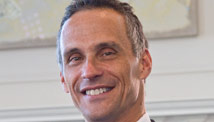Why liberal arts matter
May 21, 2011 12:26 p.m. EDT

STORY HIGHLIGHTS
- Michael S. Roth says his parents sent him to a liberal arts school to broaden his world
- He says postwar America valued well-rounded citizens to create vibrant culture, economy
- Now many make mistake of narrowing focus to science, engineering for competitive edge
- Roth: Education helps develop new skills, connections, ability to seize opportunities
Editor's note: Michael S. Roth is president of Wesleyan University. He is a historian, curator and author. His latest book, "Trauma, Memory and History: Essays on Living With the Past" (Columbia University Press), will be published in the fall. A native of Brooklyn, New York, he is in the first generation of his family to attend college. CNN's"Don't Fail Me: Education in America"  examines the crisis in the public education system. It airs at 8 ET Saturday night.
examines the crisis in the public education system. It airs at 8 ET Saturday night.
(CNN) -- When my parents arrived at Wesleyan for my graduation, they were very proud -- of themselves and of me. They hadn't known much about college when they had first sent me off to school. My father (like his father) was a furrier, and my mother had given up big band singing to raise a family. She sold clothes from our suburban basement to help make ends meet.
Sending me to a prominent liberal arts school meant something special to them because it represented access to opportunity. This wasn't only economic opportunity, but the chance to choose work, make friends and participate in a community based on educated interests rather than just social and ethnic origins.
Since I am now president of Wesleyan University, I guess we all got more than we bargained for.
My parents were part of a wave of Americans after World War II whose confidence in the future and belief in education helped create the greatest university sector in the world. Students from all walks of life began to have the chance to acquire a well-rounded education, and it was on this basis that Americans created a vibrant culture, a dynamic economy and a political system that (after many struggles) strove to make equality before the law a fundamental feature of public life.
A well-rounded education gave graduates more tools with which to solve problems, broader perspectives through which to see opportunities and a deeper capacity to build a more humane society.

Ahhh, lovely. So glad this is in a mainstream venue. I am so tired of telling my comprehensive R1, now moving in the direction of becoming a polytechnic institute, why what I do matters.
ReplyDeleteIf you need proof of the value of a well-rounded (aka "liberal arts" education), try wading through the comments.
ReplyDeleteFar too many:
> demonstrate a basic lack of comprehension (presuming that the essay advocates earning a degree in liberal arts);
> a fallacious presumption that engineering (or those other science-y professions) do not need to know how to communicate effectively;
> employ the weak argument by anecdote ("I know someone with a degree in Thinking About Hamster Fur and he works for Starbucks so obviously that degree sucks");
> the arrogant ignorance in dismissing that knowing something of fine art, history, (other) languages, behavioral sciences, etc. makes us more capable citizens of the world ... and just more interesting people!
Didn't someone say once that "Those who cannot remember the past are condemned to repeat it"?
Yeah, I'm pretty sure during in my liberal arts education I heard that somewhere.
::sigh::
Nicely put (the article, not the comments below it; the comments here, however, are nicely put).
ReplyDelete